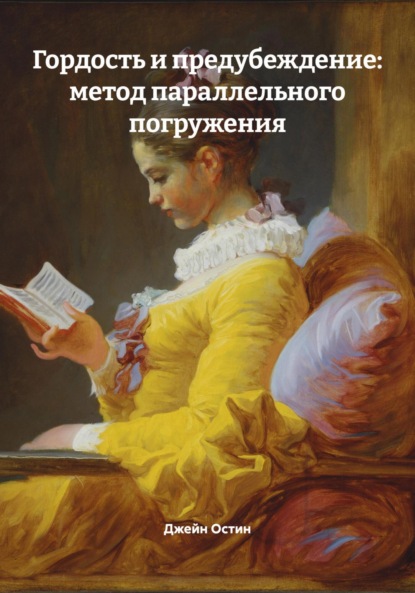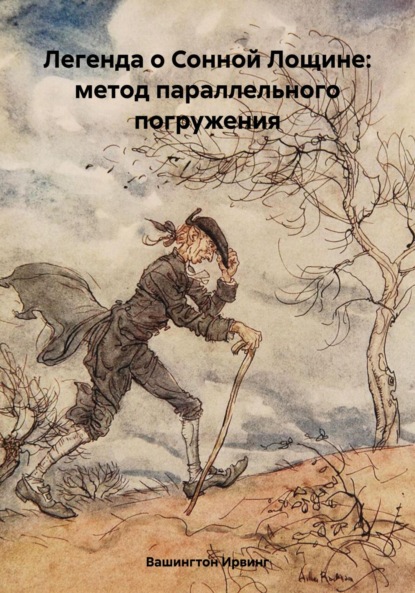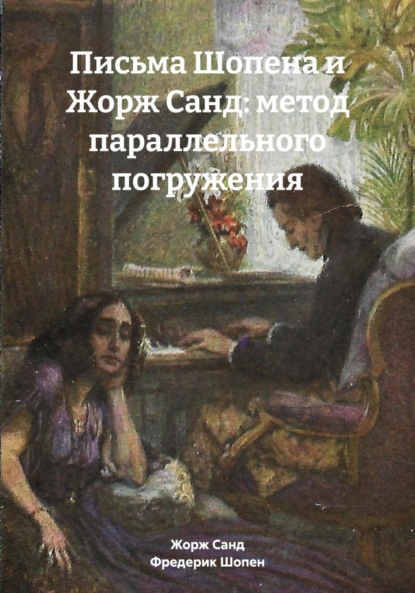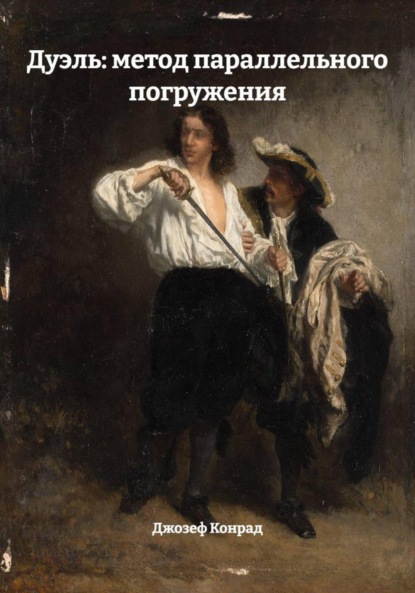Гордость и предубеждение: метод параллельного погружения

- -
- 100%
- +
An invitation to dinner was soon afterwards despatched; and already had Mrs. Bennet planned the courses that were to do credit to her housekeeping, when an answer arrived which deferred it all. Mr. Bingley was obliged to be in town the following day, and consequently unable to accept the honour of their invitation, etc. Mrs. Bennet was quite disconcerted. She could not imagine what business he could have in town so soon after his arrival in Hertfordshire; and she began to fear that he might always be flying about from one place to another, and never settled at Netherfield as he ought to be.
Lady Lucas quieted her fears a little by starting the idea of his being gone to London only to get a large party for the ball; (Леди Лукас немного успокоила её страхи, выдвинув мысль, что он уехал в Лондон лишь затем, чтобы собрать большую компанию для бала; quieted her fears – успокоила её страхи; starting the idea – предложив идею, высказав предположение; being gone – то, что он уехал; get a large party – собрать большую компанию; for the ball – на бал.) and a report soon followed that Mr. Bingley was to bring twelve ladies and seven gentlemen with him to the assembly. (и вскоре последовал слух, что мистер Бингли должен был привезти на собрание двенадцать дам и семерых джентльменов; a report soon followed – вскоре появился слух; was to bring – должен был привезти; assembly – собрание, бал.) The girls grieved over such a number of ladies; (Девушки огорчились из-за такого количества дам; grieved over – огорчились по поводу; such a number – такое количество.) but were comforted the day before the ball by hearing that, instead of twelve, (но накануне бала их утешила новость о том, что вместо двенадцати; were comforted – были утешены; by hearing that – услышав, что.) he had brought only six with him from London, his five sisters and a cousin. (он привёз с собой из Лондона лишь шестерых – пятерых сестёр и кузена; only six – всего шестерых; cousin – кузен.) And when the party entered the assembly-room, it consisted of only five altogether: (А когда компания вошла в зал собраний, она состояла всего из пяти человек; party – компания, группа; assembly-room – зал собраний, бальный зал; consisted of – состояла из; only five altogether – всего лишь пятеро.) Mr. Bingley, his two sisters, the husband of the eldest, and another young man (Мистер Бингли, его две сестры, муж старшей и ещё один молодой человек.)
Lady Lucas quieted her fears a little by starting the idea of his being gone to London only to get a large party for the ball; and a report soon followed that Mr. Bingley was to bring twelve ladies and seven gentlemen with him to the assembly. The girls grieved over such a number of ladies; but were comforted the day before the ball by hearing that, instead of twelve, he had brought only six with him from London, his five sisters and a cousin. And when the party entered the assembly-room, it consisted of only five altogether: Mr. Bingley, his two sisters, the husband of the eldest, and another young man.
Mr. Bingley was good-looking and gentlemanlike: (Мистер Бингли был приятной наружности и вёл себя, как настоящий джентльмен; good-looking – привлекательный, симпатичный; gentlemanlike – благородный, джентльменский.) he had a pleasant countenance, and easy, unaffected manners. (у него было приятное лицо и лёгкие, непринуждённые манеры; pleasant countenance – приятное выражение лица; easy, unaffected manners – непринуждённые, естественные манеры.) His sisters were fine women, with an air of decided fashion. (Его сёстры были статные дамы с явным налётом модности; fine women – элегантные, статные женщины; air of decided fashion – вид явно модный, соответствующий светскому обществу.) His brother-in-law, Mr. Hurst, merely looked the gentleman; (Его шурин, мистер Хёрст, выглядел как джентльмен – и только; merely looked – только выглядел; the gentleman – человек благородного вида.) but his friend Mr. Darcy soon drew the attention of the room (но его друг, мистер Дарси, вскоре привлёк внимание всей комнаты; drew the attention – привлёк внимание.) by his fine, tall person, handsome features, noble mien, (своей статной, высокой фигурой, красивыми чертами лица и благородной осанкой; fine, tall person – стройная высокая фигура; handsome features – привлекательные черты; noble mien – благородный вид, манера держаться.) and the report, which was in general circulation within five minutes after his entrance, (и слухом, который распространился повсеместно в течение пяти минут после его появления; in general circulation – в общем обращении, все обсуждали; entrance – появление.) of his having ten thousand a year. (о том, что у него доход в десять тысяч в год; having ten thousand a year – обладать доходом в 10 000 фунтов в год.)
Mr. Bingley was good-looking and gentlemanlike: he had a pleasant countenance, and easy, unaffected manners. His sisters were fine women, with an air of decided fashion. His brother-in-law, Mr. Hurst, merely looked the gentleman; but his friend Mr. Darcy soon drew the attention of the room by his fine, tall person, handsome features, noble mien, and the report, which was in general circulation within five minutes after his entrance, of his having ten thousand a year.
The gentlemen pronounced him to be a fine figure of a man, (Господа признали, что он – статный мужчина; pronounced – заявили, признали; fine figure of a man – статный, представительный человек.) the ladies declared he was much handsomer than Mr. Bingley, (дамы заявили, что он гораздо красивее, чем мистер Бингли; handsomer – красивее.) and he was looked at with great admiration for about half the evening, (и на него смотрели с большим восхищением примерно половину вечера; with great admiration – с большим восхищением.) till his manners gave a disgust which turned the tide of his popularity; (пока его манеры не вызвали отвращение, что резко изменило волну популярности; gave a disgust – вызвали отвращение; turned the tide – переломили, изменили ход событий; popularity – популярность.) for he was discovered to be proud, to be above his company, and above being pleased; (ибо оказалось, что он надменен, считает себя выше окружающих и вообще неспособен на простое удовольствие; proud – гордый, надменный; above his company – выше своего окружения; above being pleased – выше того, чтобы получать удовольствие.) and not all his large estate in Derbyshire could save him (и даже его большое поместье в Дербишире не смогло спасти его; estate – поместье, имущество; could save him – могло спасти его.) from having a most forbidding, disagreeable countenance, (от репутации человека с крайне отталкивающим, неприятным выражением лица; forbidding – отталкивающий; disagreeable – неприятный; countenance – лицо, выражение лица.) and being unworthy to be compared with his friend. (и от того, чтобы его сочли недостойным даже сравнения с его другом; unworthy to be compared – недостоин сравнения.)
The gentlemen pronounced him to be a fine figure of a man, the ladies declared he was much handsomer than Mr. Bingley, and he was looked at with great admiration for about half the evening, till his manners gave a disgust which turned the tide of his popularity; for he was discovered to be proud, to be above his company, and above being pleased; and not all his large estate in Derbyshire could save him from having a most forbidding, disagreeable countenance, and being unworthy to be compared with his friend.
Mr. Bingley had soon made himself acquainted with all the principal people in the room: (Мистер Бингли вскоре познакомился со всеми важными людьми в зале; had made himself acquainted with – познакомился; principal people – главные, наиболее уважаемые лица.) he was lively and unreserved, (он был живой и непринуждённый; lively – живой, энергичный; unreserved – открытый, непринуждённый.) danced every dance, (протанцевал каждый танец; every dance – каждый танец на вечере.) was angry that the ball closed so early, (рассердился, что бал закончился так рано; was angry – был недоволен; closed so early – закрылся рано.) and talked of giving one himself at Netherfield. (и заговорил о том, чтобы устроить бал у себя в Нэзерфилде; giving one – устроить один (бал); himself – сам, лично.) Such amiable qualities must speak for themselves. (Такие любезные качества говорят сами за себя; amiable – дружелюбный, любезный; speak for themselves – говорят сами за себя.) What a contrast between him and his friend! (Какой контраст между ним и его другом!) Mr. Darcy danced only once with Mrs. Hurst and once with Miss Bingley, (Мистер Дарси станцевал лишь один раз с миссис Хёрст и один раз с мисс Бингли; only once – только один раз.) declined being introduced to any other lady, (отказался от знакомства с какой-либо другой дамой; declined – отказался; being introduced – быть представленным.) and spent the rest of the evening in walking about the room, (и провёл остаток вечера, расхаживая по залу; walking about – прохаживаясь, бродя.) speaking occasionally to one of his own party. (изредка разговаривая с кем-то из своей компании; occasionally – время от времени; his own party – его собственная компания.) His character was decided. (Его характер был определён; was decided – стало ясно, был признан (такой-то).) He was the proudest, most disagreeable man in the world, (Он был самым гордым и неприятным человеком на свете; the proudest – самый надменный; disagreeable – неприятный, неприветливый.) and everybody hoped that he would never come there again. (и все надеялись, что он больше никогда туда не вернётся.) Amongst the most violent against him was Mrs. Bennet, (Среди самых ярых противников была миссис Беннет; most violent – наиболее враждебно настроенных, резких; against him – против него.) whose dislike of his general behaviour was sharpened into particular resentment (чьё неприязненное отношение к его поведению стало особенно сильным раздражением; dislike – антипатия; sharpened into – обострилась до; particular resentment – личное негодование, сильное раздражение.) by his having slighted one of her daughters. (из-за того, что он пренебрежительно отнёсся к одной из её дочерей; having slighted – проявив пренебрежение; slight – пренебречь, обидеть невниманием.)
Mr. Bingley had soon made himself acquainted with all the principal people in the room: he was lively and unreserved, danced every dance, was angry that the ball closed so early, and talked of giving one himself at Netherfield. Such amiable qualities must speak for themselves. What a contrast between him and his friend! Mr. Darcy danced only once with Mrs. Hurst and once with Miss Bingley, declined being introduced to any other lady, and spent the rest of the evening in walking about the room, speaking occasionally to one of his own party. His character was decided. He was the proudest, most disagreeable man in the world, and everybody hoped that he would never come there again. Amongst the most violent against him was Mrs. Bennet, whose dislike of his general behaviour was sharpened into particular resentment by his having slighted one of her daughters.
Elizabeth Bennet had been obliged, by the scarcity of gentlemen, to sit down for two dances; (Элизабет Беннет была вынуждена, из-за нехватки кавалеров, просидеть два танца; had been obliged – была вынуждена; scarcity of gentlemen – нехватка джентльменов, мужчин на балу; sit down for two dances – не танцевать, сидеть два танца подряд.) and during part of that time, Mr. Darcy had been standing near enough (и в течение части этого времени мистер Дарси стоял достаточно близко; had been standing – стоял (продолжительное прошедшее время); near enough – достаточно близко.) for her to overhear a conversation between him and Mr. Bingley, (чтобы она могла подслушать разговор между ним и мистером Бингли; overhear – подслушать; a conversation between – разговор между.) who came from the dance for a few minutes to press his friend to join it. (который отошёл от танца на несколько минут, чтобы уговорить своего друга присоединиться; press his friend – настаивать, уговаривать друга; to join it – присоединиться к танцу.)
Elizabeth Bennet had been obliged, by the scarcity of gentlemen, to sit down for two dances; and during part of that time, Mr. Darcy had been standing near enough for her to overhear a conversation between him and Mr. Bingley, who came from the dance for a few minutes to press his friend to join it.
“Come, Darcy,” said he, “I must have you dance. («Пойдём, Дарси, – сказал он, – ты обязан потанцевать; I must have you dance – я настаиваю, чтобы ты танцевал.) I hate to see you standing about by yourself in this stupid manner. (Мне ненавистно видеть, как ты стоишь в одиночестве в такой глупой позе; standing about – слоняться, стоять без дела; by yourself – один; in this stupid manner – в такой глупой манере.) You had much better dance.” (Тебе гораздо лучше было бы потанцевать; had much better – тебе бы лучше.)
“I certainly shall not. («Определённо, я не буду; shall not – не стану (устойчиво: категорический отказ).) You know how I detest it, unless I am particularly acquainted with my partner. (Ты знаешь, как я это ненавижу, если только я не особенно хорошо знаком с партнёршей; detest – ненавидеть; particularly acquainted – особенно знаком.) At such an assembly as this, it would be insupportable. (На таком собрании, как это, это было бы невыносимо; assembly – собрание, бал; insupportable – невыносимо.) Your sisters are engaged, (Твои сёстры уже приглашены; are engaged – (уже) заняты, уже есть партнёры.) and there is not another woman in the room whom it would not be a punishment to me to stand up with.” (и в зале нет ни одной женщины, с которой танцевать не было бы для меня настоящим наказанием; not another woman – ни одной другой женщины; a punishment to stand up with – наказание стоять с ней в паре / танцевать с ней.)
“Come, Darcy,” said he, “I must have you dance. I hate to see you standing about by yourself in this stupid manner. You had much better dance.”
“I certainly shall not. You know how I detest it, unless I am particularly acquainted with my partner. At such an assembly as this, it would be insupportable. Your sisters are engaged, and there is not another woman in the room whom it would not be a punishment to me to stand up with.”
“I would not be so fastidious as you are,” cried Bingley, “for a kingdom! («Я бы не был таким привередливым, как ты, – воскликнул Бингли, – даже за целое королевство!; fastidious – привередливый, избирательный; for a kingdom – даже за королевство / ни за что.) Upon my honour, I never met with so many pleasant girls in my life as I have this evening; (Честное слово, я никогда в жизни не встречал столько приятных девушек, как сегодня вечером; upon my honour – честное слово; pleasant girls – приятные девушки; as I have this evening – как встретил этим вечером.) and there are several of them, you see, uncommonly pretty.” (и несколько из них, как видишь, необычайно хорошенькие; several of them – несколько из них; uncommonly pretty – необычайно симпатичные.)
“You are dancing with the only handsome girl in the room,” said Mr. Darcy, looking at the eldest Miss Bennet. («Ты танцуешь с единственной красивой девушкой в комнате, – сказал мистер Дарси, глядя на старшую мисс Беннет; the only handsome girl – единственная красивая девушка; eldest Miss Bennet – старшая мисс Беннет, т.е. Джейн.)
“Oh, she is the most beautiful creature I ever beheld! («О, она – самое прекрасное создание, которое я когда-либо видел!; the most beautiful creature – самое красивое создание; I ever beheld – я когда-либо видел.) But there is one of her sisters sitting down just behind you, who is very pretty, and I dare say very agreeable. (Но одна из её сестёр сидит прямо за тобой – она очень мила, и, осмелюсь сказать, весьма приятная в общении; sitting down just behind you – сидит прямо за тобой; very pretty – очень симпатичная; dare say – осмелюсь сказать; agreeable – милая, приятная.) Do let me ask my partner to introduce you.” (Позволь мне попросить свою партнёршу представить тебя ей; do let me – позволь же мне (усиленная форма просьбы); ask … to introduce you – попросить представить тебя.)
“I would not be so fastidious as you are,” cried Bingley, “for a kingdom! Upon my honour, I never met with so many pleasant girls in my life as I have this evening; and there are several of them, you see, uncommonly pretty.”
“You are dancing with the only handsome girl in the room,” said Mr. Darcy, looking at the eldest Miss Bennet.
“Oh, she is the most beautiful creature I ever beheld! But there is one of her sisters sitting down just behind you, who is very pretty, and I dare say very agreeable. Do let me ask my partner to introduce you.”
“Which do you mean?” («Кого ты имеешь в виду?»; which – которая (из них); do you mean – ты имеешь в виду?) and turning round, he looked for a moment at Elizabeth, (и, повернувшись, он на мгновение посмотрел на Элизабет; turning round – обернувшись; looked for a moment – посмотрел на мгновение.) till, catching her eye, he withdrew his own, (пока, встретившись с её взглядом, не отвёл свой; catching her eye – поймав её взгляд; withdrew his own – отвёл свой (взгляд).) and coldly said, “She is tolerable: but not handsome enough to tempt me; (и холодно сказал: «Она сносная, но недостаточно красива, чтобы меня соблазнить; tolerable – сносная, терпимая; not handsome enough – недостаточно красивая; to tempt me – чтобы соблазнить меня, привлечь.) and I am in no humour at present to give consequence to young ladies (и я сейчас вовсе не в настроении придавать значение юным леди; in no humour – не в настроении; to give consequence – придавать значение, выражать внимание.) who are slighted by other men. (которые пренебрегаемы другими мужчинами; slighted – проигнорированы, обойдены вниманием.) You had better return to your partner and enjoy her smiles, (Тебе лучше вернуться к своей партнёрше и наслаждаться её улыбками; you had better – тебе бы лучше; enjoy her smiles – наслаждаться её улыбками.) for you are wasting your time with me.” (потому что ты зря тратишь на меня своё время; wasting your time – тратишь впустую своё время.)
“Which do you mean?” and turning round, he looked for a moment at Elizabeth, till, catching her eye, he withdrew his own, and coldly said, “She is tolerable: but not handsome enough to tempt me; and I am in no humour at present to give consequence to young ladies who are slighted by other men. You had better return to your partner and enjoy her smiles, for you are wasting your time with me.”
Mr. Bingley followed his advice. (Мистер Бингли последовал его совету.) Mr. Darcy walked off; (Мистер Дарси ушёл; walked off – удалился, ушёл прочь.) and Elizabeth remained with no very cordial feelings towards him. (а Элизабет осталась без особых тёплых чувств к нему; no very cordial feelings – не очень дружелюбные чувства; cordial – сердечные, доброжелательные.) She told the story, however, with great spirit among her friends; (Тем не менее, она рассказала эту историю с большим оживлением своим подругам; with great spirit – с воодушевлением, живо.) for she had a lively, playful disposition, (потому что у неё был живой, игривый характер; lively, playful disposition – живой, склонный к шутке нрав.) which delighted in anything ridiculous. (который находил удовольствие во всём смешном; delighted in – наслаждался; anything ridiculous – всё смешное, нелепое.)
Mr. Bingley followed his advice. Mr. Darcy walked off; and Elizabeth remained with no very cordial feelings towards him. She told the story, however, with great spirit among her friends; for she had a lively, playful disposition, which delighted in anything ridiculous.
The evening altogether passed off pleasantly to the whole family. (Вечер в целом прошёл приятно для всей семьи; altogether – в целом; passed off pleasantly – прошёл приятно.) Mrs. Bennet had seen her eldest daughter much admired by the Netherfield party. (Миссис Беннет видела, как её старшая дочь вызывала большое восхищение у гостей из Нэзерфилда; much admired – очень восхищались; Netherfield party – компания из Нэзерфилда.) Mr. Bingley had danced with her twice, (Мистер Бингли танцевал с ней дважды.) and she had been distinguished by his sisters. (и она была отмечена вниманием со стороны его сестёр; distinguished by – отмечена, выделена кем-то.) Jane was as much gratified by this as her mother could be, though in a quieter way. (Джейн была так же довольна этим, как и её мать, хотя выражала это более сдержанно; gratified – довольна, удовлетворена; in a quieter way – более спокойно, сдержанно.) Elizabeth felt Jane’s pleasure. (Элизабет разделяла радость Джейн; felt … pleasure – прочувствовала радость.) Mary had heard herself mentioned to Miss Bingley as the most accomplished girl in the neighbourhood; (Мэри услышала, как мисс Бингли назвали её самой образованной девушкой в округе; accomplished girl – образованная, хорошо воспитанная девушка.) and Catherine and Lydia had been fortunate enough to be never without partners, (а Кэтрин и Лидия имели счастье всё время быть при партнёрах; fortunate enough – достаточно удачливы; never without partners – никогда не оставались без кавалеров.) which was all that they had yet learnt to care for at a ball. (а это было всё, что они пока научились ценить на балах; learnt to care for – научились считать важным.)
The evening altogether passed off pleasantly to the whole family. Mrs. Bennet had seen her eldest daughter much admired by the Netherfield party. Mr. Bingley had danced with her twice, and she had been distinguished by his sisters. Jane was as much gratified by this as her mother could be, though in a quieter way. Elizabeth felt Jane’s pleasure. Mary had heard herself mentioned to Miss Bingley as the most accomplished girl in the neighbourhood; and Catherine and Lydia had been fortunate enough to be never without partners, which was all that they had yet learnt to care for at a ball.
They returned, therefore, in good spirits to Longbourn, (Поэтому они вернулись в хорошем настроении в Лонгборн; in good spirits – в хорошем настроении.) the village where they lived, and of which they were the principal inhabitants. (в деревню, где они жили и были главными жителями; principal inhabitants – главные, наиболее заметные жители.) They found Mr. Bennet still up. (Они застали мистера Беннета ещё не спящим; still up – ещё не лёг спать.) With a book, he was regardless of time; (С книгой он забывал о времени; regardless of time – не замечал времени.) and on the present occasion he had a good deal of curiosity (и в этот вечер у него было изрядное любопытство; on the present occasion – в данном случае, на этот раз; a good deal of curiosity – немалый интерес.) as to the event of an evening which had raised such splendid expectations. (к событию вечера, от которого ждали столь блистательных результатов; event of an evening – исход вечера; splendid expectations – блестящие ожидания.) He had rather hoped that all his wife’s views on the stranger would be disappointed; (Он, скорее, надеялся, что все надежды жены на незнакомца не оправдаются; had rather hoped – скорее надеялся; views on the stranger – представления о незнакомце; would be disappointed – окажутся обманутыми.) but he soon found that he had a very different story to hear. (но вскоре понял, что услышит совсем иную историю; a very different story – совсем другая история.)








